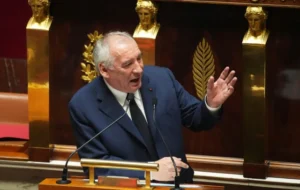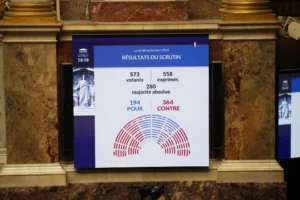7 Shocking Facts About the France Government Collapse – What It Means for Macron
France is facing one of its most dramatic political moments in recent memory. The sudden collapse of the government has sent shockwaves through the country, leaving citizens, politicians, and international observers scrambling to understand what just happened. Prime Minister François Bayrou lost a critical confidence vote in parliament, forcing his resignation and thrusting President Emmanuel Macron into uncharted waters. With snap elections looming, the future of France’s leadership and the stability of its policies has become uncertain.
This crisis is more than just a political hiccup; it exposes the deep divisions within the ruling coalition and the challenges of governing in a fragmented political landscape. Tensions over economic reforms, social policies, and legislative priorities have all contributed to this abrupt fall, leaving analysts and citizens questioning whether France’s semi-presidential system is as stable as it appears.
For everyday French citizens, the collapse raises pressing concerns: What happens to ongoing reforms? How will public services be affected? What does this mean for the economy? At the same time, global markets and European allies are watching closely, worried about potential ripple effects on trade, investment, and international relations.
Lawmakers are already strategizing for what comes next. Opposition parties are preparing to capitalize on the government’s vulnerability, while Macron’s team is under pressure to quickly navigate the political maze and maintain public confidence. Media outlets across the world are reporting in real time, highlighting the gravity of this unprecedented moment.
In this article, we’ll walk you through seven eye-opening facts about the France government collapse, analyze its political and economic impact, look at historical parallels, and explore what this could mean for citizens and the international community. From snap elections to the challenges of coalition politics, we’ll break it all down so you can fully grasp why this is a story that matters not just in France, but globally.
Whether you’re a political enthusiast, an investor, or simply someone trying to make sense of the headlines, this article will serve as your guide to understanding the complexities and consequences of one of the most significant political events in recent European history.

1. François Bayrou Loses Confidence Vote – The Trigger of the Collapse
On August 28, 2025, François Bayrou, the French Prime Minister, faced a no-confidence vote in the French Parliament. This vote ended in his defeat, marking the first domino in the France government collapse. Bayrou, who was seen as Macron’s right-hand man, had been grappling with growing dissatisfaction from lawmakers who criticized his handling of economic reforms and social policies.
Losing a confidence vote in France is a severe political signal, as it reflects a lack of parliamentary support for the executive branch. This defeat meant Bayrou could no longer lead the government, prompting his immediate resignation.
The France government collapse is especially significant because it comes during a period of economic uncertainty in Europe, raising concerns about governance, policy continuity, and investor confidence.
2. Macron Forced Into Snap Elections
Following the resignation of Bayrou, President Macron has no choice but to navigate a challenging political landscape. Snap elections are now imminent, with the possibility of a hung parliament or a dramatic reshuffling of political alliances.
Historically, snap elections in France can shift the balance of power. Macron’s party, La République En Marche, may face significant losses if public sentiment aligns with growing unrest in urban centers and rural regions. Analysts warn that these elections could redefine the French political spectrum, impacting both domestic policy and France’s role in the European Union.
The France government collapse forces Macron to strategize quickly, considering alliances with opposition parties, appeasing discontented factions within his own party, and presenting a vision that can convince voters of stability and continuity.
3. How the French Parliament Triggered the Collapse
The no-confidence vote against Bayrou was a culmination of mounting tensions within the French Parliament. Several lawmakers from both ruling and opposition parties cited dissatisfaction with recent policy decisions, including controversial economic reforms and the handling of social unrest.
This parliamentary action highlights the importance of legislative oversight in France’s semi-presidential system. Unlike purely parliamentary systems, where a prime minister relies heavily on legislative support, France’s executive powers allow the President to dissolve the National Assembly. However, losing a prime minister to a confidence vote signals a significant political crisis.
The France government collapse illustrates the delicate balance between executive authority and legislative oversight, showing how a single vote can reshape the political trajectory of the country.

4. Global Market & EU Reactions
The news of the France government collapse sent immediate ripples through global markets. Investors reacted cautiously, leading to a temporary dip in French stock indices and European bonds. Analysts point out that political instability in France, Europe’s second-largest economy, can influence market sentiment across the continent.
European Union officials have also closely monitored the situation. As one of the EU’s key players, France’s governance instability raises questions about policy continuity on critical matters such as energy, defense, and trade. EU diplomats have called for calm, emphasizing that France remains committed to EU obligations despite the political upheaval.
The France government collapse is not just a domestic issue – it has significant international implications, affecting trade, investment, and European political cohesion.
5. Macron’s Political Future – High Stakes Ahead
Emmanuel Macron now faces the biggest challenge of his political career. The France government collapse not only weakens his immediate executive support but also places him under intense scrutiny from voters and opposition leaders.
Political analysts argue that Macron’s survival depends on his ability to present a clear plan to restore stability, implement effective economic measures, and maintain France’s influence on the global stage. Public opinion is increasingly polarized, and the upcoming snap elections will serve as a referendum on Macron’s leadership style, policy decisions, and overall vision for France.
In addition, internal party dynamics will play a crucial role. Macron must negotiate with various factions to ensure his legislative agenda can continue, avoiding further political paralysis.
6. Public Response – Citizens React to the Crisis
The France government collapse has triggered strong reactions across the country. Citizens in Paris and other major cities took to social media to express concern, confusion, and curiosity about what comes next. Street protests have been minimal so far, but there is growing public debate about transparency, accountability, and the role of elected officials in preventing political crises.
Public sentiment is also influenced by the media coverage of the collapse. French newspapers, television channels, and online platforms are continuously reporting updates, interviews, and expert analyses. The combination of social media and traditional news sources ensures that the France government collapse remains a central topic of discussion across demographics.
7. Possible New Leadership and Scenarios Ahead
As the country prepares for snap elections, several potential scenarios emerge. Macron may appoint a caretaker prime minister until elections conclude, or new political coalitions could form that challenge his dominance.
Political experts predict that the elections could lead to:
A coalition government between Macron’s party and centrist or moderate opposition groups
A rise of fringe parties capitalizing on voter dissatisfaction
Shifts in policy priorities, particularly in economic reforms and foreign relations
The France government collapse opens the door for both challenges and opportunities. How Macron and other political leaders navigate this period will determine the stability and direction of France for years to come.
FAQs on France Government Collapse
Q1: What led to the France government collapse in 2025?
A1: The France government collapse occurred after Prime Minister François Bayrou lost a confidence vote in Parliament. Political disagreements within the ruling coalition, combined with opposition pressure and recent economic challenges, triggered the crisis.
Q2: Who will replace François Bayrou as Prime Minister?
A2: President Emmanuel Macron is expected to appoint a new Prime Minister. Various political analysts suggest possible candidates from within his party or a coalition ally, but the official announcement will clarify the successor.
Q3: Will there be snap elections following the France government collapse?
A3: While the immediate collapse does not automatically trigger elections, the political instability increases the likelihood of snap elections. Lawmakers and the President will evaluate options based on parliamentary support.
Q4: How does the France government collapse affect the French economy?
A4: Political uncertainty can impact investor confidence, stock markets, and business decisions. Industries may delay major investments, and the Euro could experience short-term volatility as markets react to the government instability.
Q5: What are the implications for France’s international relations?
A5: The France government collapse could affect diplomatic negotiations and policy continuity. EU allies, the US, and other international partners may adopt a cautious approach until a stable government is formed.
Q6: Has France experienced similar government collapses before?
A6: Yes, France’s semi-presidential system has seen multiple government collapses historically, especially during coalition disagreements. However, each collapse varies in political and economic impact depending on the circumstances.
Q7: How long will it take for France to have a stable government again?
A7: The timeline depends on political negotiations, coalition-building, and possible elections. Analysts estimate that it could take weeks to months for a fully stable government to be in place.
Q8: How did public opinion react to the France government collapse?
A8: Citizens expressed mixed reactions, with protests in some cities and public debates on social media. Many are concerned about policy continuity, especially regarding taxes, employment, and social welfare programs.
Q9: What role did opposition parties play in the France government collapse?
A9: Opposition parties in Parliament played a critical role by challenging the coalition’s policies and rallying votes against Prime Minister Bayrou in the confidence motion. Their pressure highlighted the fragility of the current government structure.
Q10: Could the France government collapse impact upcoming elections?
A10: Yes, political instability often influences voter sentiment and party strategies. Parties may adjust their campaigns, and voter turnout could be affected depending on public confidence in the new leadership.
Q11: Are there risks of international consequences from the France government collapse?
A11: Potential risks include temporary diplomatic delays, shifts in EU policy negotiations, and market reactions affecting trade agreements. However, France’s institutions are resilient, and long-term impacts are expected to be manageable.
Q12: What does the France government collapse mean for Macron’s presidency?
A12: The collapse tests President Macron’s political leverage and ability to maintain coalition support. Successfully appointing a capable new Prime Minister could stabilize his presidency, while delays or missteps might weaken his influence.
Q13: How does the media cover the France government collapse?
A13: International and domestic media are providing extensive coverage, analyzing political maneuvering, expert opinions, and potential economic fallout. Media scrutiny increases pressure on political leaders to act swiftly.
Conclusion
The France government collapse marks a historic and unprecedented turning point in the country’s political landscape. From Prime Minister François Bayrou’s unexpected resignation after losing the confidence vote to President Emmanuel Macron now facing the challenge of calling snap elections, this event has highlighted just how delicate parliamentary support can be in a modern democracy. The uncertainty surrounding coalition dynamics, policy continuity, and leadership stability has put both the government and its citizens under intense scrutiny.
Global markets, European Union partners, and international observers are closely watching each move, as the political instability in France could have ripple effects across trade, diplomacy, and regional cooperation. French citizens themselves are grappling with the implications of this sudden shift, wondering how it will affect domestic policies, social reforms, and economic strategies in the months to come.
While the immediate future appears uncertain, one fact is undeniable: the France government collapse will leave a lasting mark on governance, public trust, and the nation’s influence within Europe. How Macron navigates this period through coalition building, legislative maneuvers, and public engagement will be crucial in shaping both his legacy and the country’s trajectory.
Staying informed, following credible news outlets, and analyzing parliamentary developments will be key for understanding the broader implications of this political crisis. For readers seeking deeper insights, exploring related articles on European politics, Macron’s leadership strategies, and the evolving French parliamentary system can provide valuable perspectives.
For more such detailed articles, check out ReadIvy’s Global Category.
For more clarity, check out other verified sources like BBC.
For other topics such as technology, check out this article by ReadIvy on the iphone 17 Pro & iphone 17 Pro Max.
ReadIvy is your go-to platform for insightful articles, breaking news, and expert guides across multiple categories. From the latest in technology, business, and finance to lifestyle, health, and entertainment, ReadIvy delivers content that keeps readers informed and engaged. Our team curates trending topics, in-depth analyses, and actionable advice to help you stay ahead in an ever-changing world. Whether you’re exploring the newest gadgets, understanding market trends, or learning tips for personal growth, ReadIvy ensures high-quality, reliable information. Discover a world of knowledge, stay updated, and make smarter decisions with ReadIvy every day.









